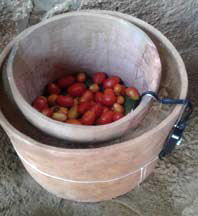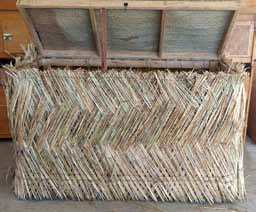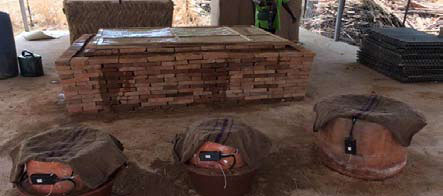The sight of rotting mangoes in a few weeks’ time will be awash in the country. Mangoes, a second fruit crop in Kenya, is a seasonal crop with high and low seasons. In most counties the seasons start from December and peaks in January to February.
Interestingly, this scenario predisposes fruit farmers, especially small-scale farmers from Makueni, Kitui, Kilifi,

technology
Murang’a and Embu counties in Kenya to exploitation by traders who offer very low prices for their produce.
Post-harvest experts estimate that 40-50 per cent of fruits and vegetables produced in Kenya are lost or wasted along the value chain. In Kenya alone, 80 per cent of the mangoes are eaten while still fresh, hence the need to increase their shelf life. The losses are majorly caused by lack of access to affordable and appropriate technologies for handling and storage of the highly perishable commodities. However, these ugly scenarios will soon be averted through the use of simple technologies that fruit and vegetable farmers can adapt and use in the farm to curb the losses of agricultural produce hence supporting livelihoods and food security.
Adopting low-tech post-harvest innovations for storing fruits and vegetables could save Kenyan farmers unnecessary wastes by prolonging the shelf life of their fresh farm produce, adds the experts.
Evaporative cooling technologies for improved fruit and vegetable storage from Mali would be most effective in helping farmers increase farm produces’ shelf life in Kenya and other countries. The low-cost technology will enable farmers attain the quality, quantity and consistency required by mango traders hence the ability to increase profits by negotiating for better prices.
Unlike Kenya, Mali farmers have explored widespread use of brick, straw and sack evaporative cooling chambers (ECC) and pot-in-pot, round pot-in-dish and cylinder pot-in-dish clay pot coolers. A survey on evaluation of various low-cost vegetable cooling and storage technologies in Mali that looked at the impact of evaporative cooling on vegetables shelf life, painted a promising picture on its benefits to farmers.
Conducted between May and July 2017, the study was led by Dr EricVerploegen of the D-Lab and Dr Ousmane Sanogo and Dr Takemore Chagomoka former World Vegetable Center-Mali scientists among farmer groups in Sikasso and Mopti regions in Mali. The study titled “Evaporative Cooling Technologies for Improved Vegetable Storage in Mali” looked at the seasonal temperatures and humidity profiles of the two regions in Mali and how it affected the shelf life of vegetables including eggplant and tomatoes.

To gain insight into evaporative cooling device use and preferences, the team conducted interviews in Mali with users of the cooling and storage systems and with stakeholders along the vegetable supply chain. They also deployed automatic sensors to monitor product performance parameters.
According to results from 80 respondents involved in the study, the shelf life of eggplants and tomatoes were significantly longer in Sikasso than Mopti for all vegetables. This difference, says the authors, is likely due to the significant variations in climate conditions between the two regions, which affect the storage conditions experienced by the vegetables in the ECCs.
The eggplants and tomatoes in the straw and sack ECCs in Sikasso were stored in conditions that were an average of over 2 °C lower and 20 percent higher humidity than the vegetables in the straw and sack ECCs in Mopti. “Similarly, the average ambient conditions throughout the study period were more favourable for vegetable storage in Sikasso than in Mopti, as Sikasso is situated in the Sudan-Savanna zone while Mopti is part of the hotter and dryer Sahel-Saharan zone in Mali,” reads the study.

Just like Mali, intermittent power supplies and lack of proper storage facilities mean that a lot of farm produce often goes to waste before it arrives in the market in Kenya. But the researchers, now think, that by exploring such ecofriendly off-grid innovations farmers can manage without electricity. In potin-pot technology, a small clay pot is inserted into a large one leaving space between the two. The cavity is then filled with sand, which serves as a medium for holding water for the evaporative cooling. The innovation, adds the authors, is also best suited for household use because of the small volume of produce storable.
However, warns Dr Sanogo, one of the authors of the report, evaporative cooling devices are not appropriate for all settings. He adds, “It is best suited to communities where there is access to water and fruits and vegetable storage needed during hot and dry weather.”
Automatic data sensors used in the study revealed that users were more inclined to water the cooling devices in the dry season and reduce the usage of the devices as the rainy season started.
The decrease in the temperature, along with the increased humidity and protection from pests provided by the devices, resulted in significant increases in shelf life for commonly stored vegetables including tomatoes, cucumbers, eggplant, cabbage, and hot peppers.

As Kenya gears up for another mango fruit glut and other successive vegetable seasons, the Mali experience is quite an eye opener and potential in aiding small-scale farmers address many of the challenges that face rural households and farmers in need of improved post-harvest vegetable storage.






